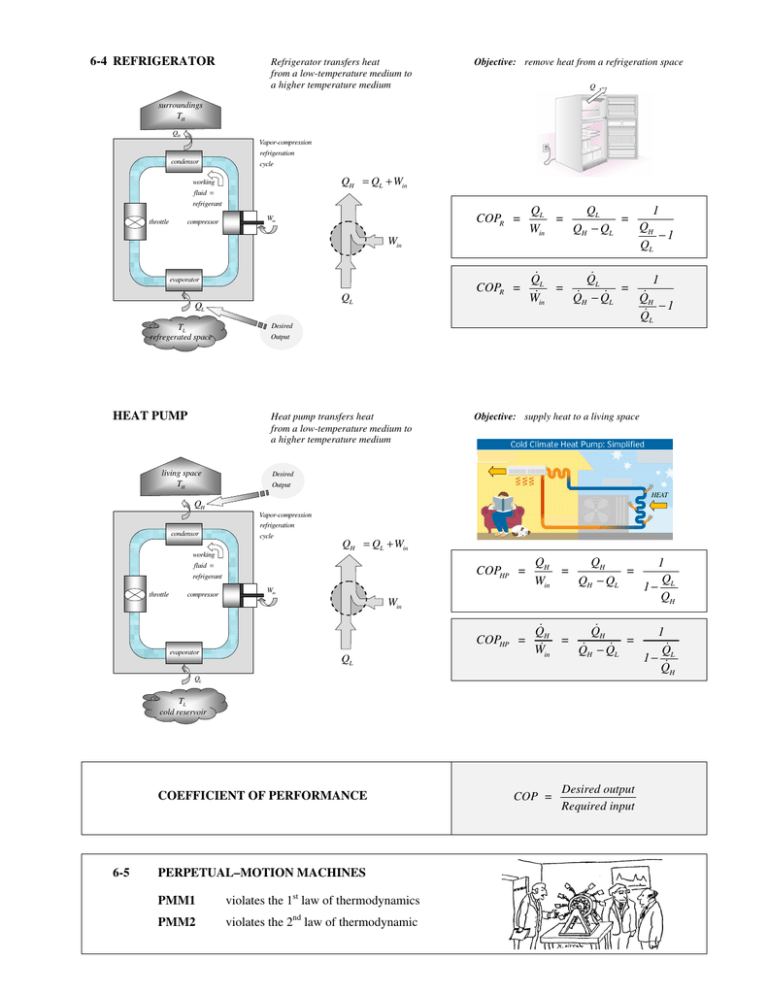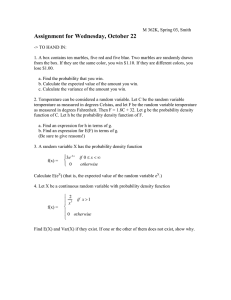Coefficient of Performance, Refrigerator, Heat Pump
advertisement

6-4 REFRIGERATOR Refrigerator transfers heat from a low-temperature medium to a higher temperature medium Objective: remove heat from a refrigeration space Q surroundings TH QH Vapor-compression condensor refrigeration cycle QH = QL + Win working fluid = refrigerant compressor throttle COPR = Win Win evaporator QL QL TL refregerated space HEAT PUMP COPR = Desired Output Heat pump transfers heat from a low-temperature medium to a higher temperature medium living space TH QL QL 1 = = QH Win QH − QL −1 QL Q Q 1 L L = = Win QH − QL QH −1 Q L Objective: supply heat to a living space Desired Output HEAT QH Vapor-compression condensor refrigeration cycle QH = QL + Win working fluid = refrigerant compressor throttle COPHP = QH QH = = Win QH − QL 1 Q 1− L QH COPHP = Q Q H H = in −Q = W Q H L 1 Q 1− L Q H Win Win evaporator QL QL TL cold reservoir COEFFICIENT OF PERFORMANCE 6-5 PERPETUAL–MOTION MACHINES PMM1 violates the 1st law of thermodynamics PMM2 violates the 2nd law of thermodynamic COP = Desired output Required input Planck, p.86 §112. A process which can in no way be completely reversed is termed irreversible, all other processes reversible. That a process may be irreversible, it is not sufficient that it cannot be directly reversed. This is the case with many mechanical processes which are not irreversible (cf. 113). The full requirement is, that it be impossible, even with the assistance of all agents in nature, to restore everywhere the exact initial state when the process has once taken place. The propositions of the three preceding paragraphs, therefore, declare, that the generation of heat by friction, the expansion of a gas without the performance of external work and the absorption of external heat, the conduction of heat, etc., are irreversible processes. §115. Since there exists in nature no process entirely free from friction or heat-conduction, all processes which actually take place in nature, if the second law be correct, are in reality irreversible ; reversible processes form only an ideal limiting case. §116. The second fundamental principle of thermodynamics being, like the first, an empirical law, we can speak of its proof only in so far as its total purport may be deduced from a single self-evident proposition. We, therefore, put forward the following proposition as being given directly by experience : It is impossible to construct an engine which will work in a complete cycle, and produce no effect except the raising of a weight and the cooling of a heat-reservoir. Such an engine could be used simultaneously as a motor and a refrigerator without any waste of energy or material, and would in any case be the most profitable engine ever made. It would, it is true, not be equivalent to perpetual motion, for it does not produce work from nothing, but from the heat, which it draws from the reservoir. It would not, therefore, like perpetual motion, contradict the principle of energy, but would, nevertheless, possess for man the essential advantage of perpetual motion, the supply of work without cost ; for the inexhaustible supply of heat in the earth, in the atmosphere, and in the sea, would, like the oxygen of the atmosphere, be at everybody's immediate disposal.


